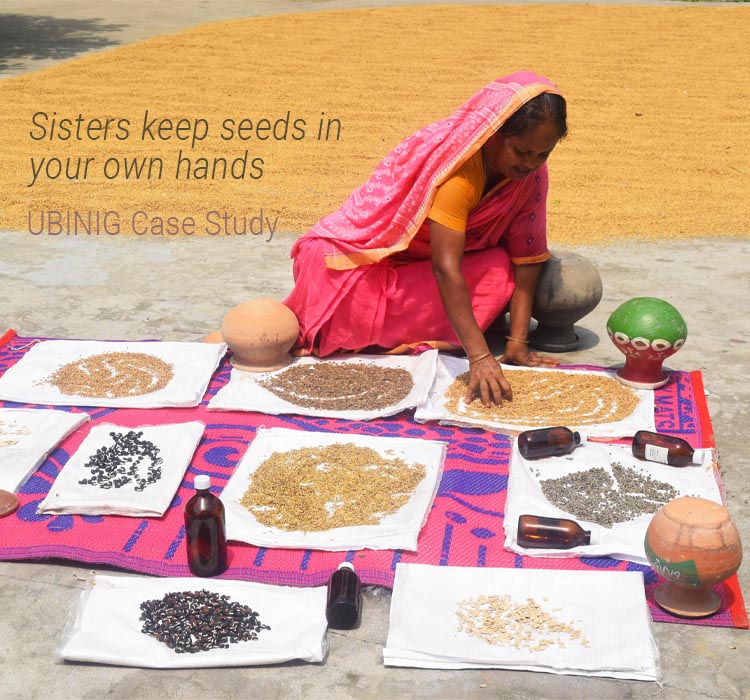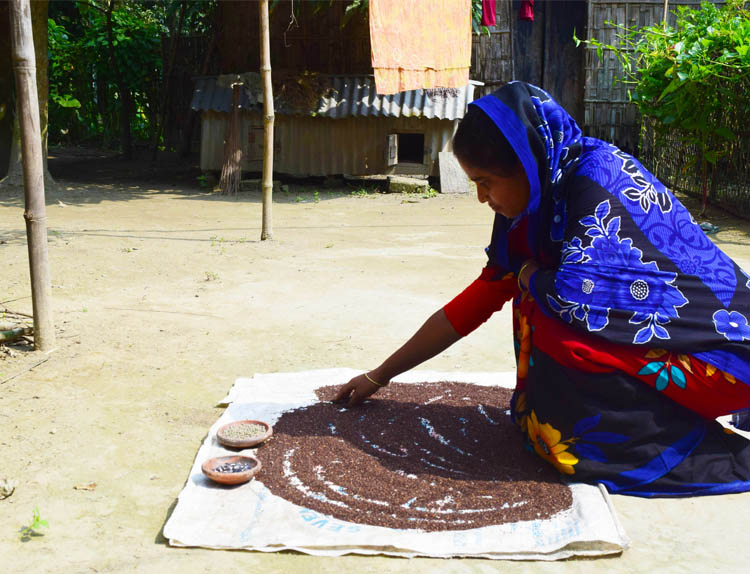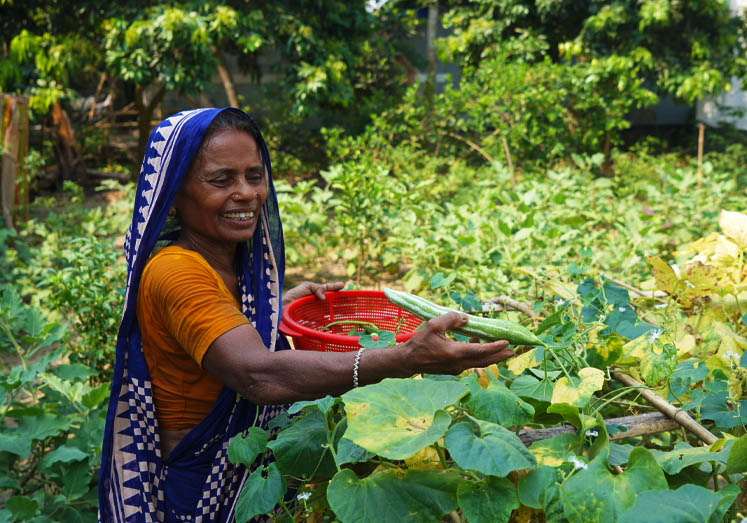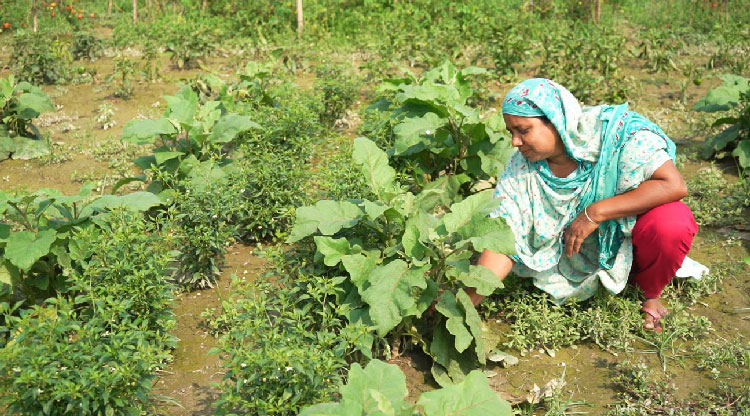Nayakrishi women gain command over seeds sdf
 UBINIG || Sunday 12 May 2024 ||
UBINIG || Sunday 12 May 2024 ||
“Sisters keep seeds in your own hands” is a powerful slogan of Nayakrishi farmers asserting the feminine role of seed keeping and regeneration of life. Nayakrishi Andolon, a movement of small-scale farmers practising biodiversity-based agriculture, is led mainly by women. Introducing the so-called ‘modern’ agriculture was a shift from the principle of biology and centrality of life to the deadly practice of chemicals, pesticides, and herbicides. Environmental destruction and ecocide are the results, along with shifts from quality to quantity of food production. The practice of the quantitative paradigm in agriculture replaced the indigenous seeds that served multiple agroecological and nutritional functions. In the name of productivity, HYV and hybrids were introduced.
The neoliberal economic policy started in the 90s and soon began to replace the farmers' seed systems with corporate seed markets and commercial seeds. Overall effects on women farmers and small farmers' households have been devastating and disempowering. The new agricultural practice did not require women to preserve seeds and use their agroecological knowledge that has historically been serving as the foundation of farming. Nayakrishi Andolon is active in enhancing the mobilizing capacity of farmers and promoting agroecological farming practices. It is based on carefully selected local seeds and emphasises the critical and challenging role seeds and genetic resource conservation play in ensuring food & seed sovereignty and the nutritional needs of the community.
Industrialisation of food production or the modern agriculture started in 1970s. By the 1990s most small-scale farmers gradually losing their capacity to cope with the rising cost of agricultural inputs, were forced to change their occupation to non-farming activities. This was the government's intended development policy prescribed by the international development organizations to release people from land and turn them into cheap labour for the industrial sector for the emerging export-oriented pockets to serve global capital. The impact had been severe for small farming households since women were the primary targets as the source of passive, obedient, and cheap labour power. The agricultural and industrial policies had been fashioned in line to realize the targets. The era of development interventions began with multilateral and bilateral agencies. The ideological articulation of this policy has resulted in a quantitative increase in rice production, ignoring agriculture's overall environmental, agroecological, nutritional, and medicinal role. In all these aspects of agriculture, women have been playing pivotal roles in keeping their families fed and nutritionally healthy. Since the 1990s, the agricultural sector's contribution to the GDP has been visible, gradually reducing from 38% to only 12.9% in 2020 [WB, 2020]. The idea that progress means the destruction of agriculture and uncritical support for industrialization and urbanization got strong ideological holds in development policies.
Modern agriculture by design was an assault on women, the environment, and agroecology. Industrial seeds produced in the laboratory hardly have any concerns regarding diverse agroecological conditions; industrial seeds require homogenization of production conditions. The homogenization of land conditions destroyed the natural agroecological foundation of agriculture. They started to replace the traditional variety of seeds that farmers discovered and invented to suit local climate, agroecological conditions, and social and cultural needs. Artificial laboratory seeds are receptive to chemical fertilizers and pesticides. The industrial seeds' lack of connection or relation to the local landscapes, environment, agroecology, or farmers’ knowledge systems has been devastating. More importantly, these laboratory seeds are simply based on discarding and replacing the farmer's seed systems.
Nayakrishi women farmers described the industrial seeds on their land as “a destruction of their body.” By body, they meant not only their physical body but the environment and all life forms in their surroundings. They could immediately see and anticipate the danger of men buying seeds from the market and not keeping them in their own hands. Losing seed is equivalent to losing power and command over agricultural production. Industrial and commercial seeds are instruments of corporate power and, indeed replace the control and command of women in farming.
The World Bank and international donor agencies proposed export-oriented industrialization with cheap female labor-based readymade garment industries and shrimp production in coastal districts. Bangladesh earned a massive amount of foreign exchange by engaging girls from rural farming families coming to the cities to be employed in the garment sector. In fiscal year 23, the RMG sector contributed 10.35% to the GDP, and the knitwear and woven sectors contributed to more than 84% of the total export earnings. About 4.2 million workers (primarily women) are employed [Bangladesh Bank, April-June FY23]. Employing many low-wage female labourers was seen as empowerment, while the women in the farming households were disempowered. These female laborers, contributing billions of dollars to the country's foreign exchange, earned only 113 USD per month as minimum wage. The crux of the profit in the RMG sector is only in paying lower wages to the women workers. The farmers' daughters were allowed to work in the factories in the cities only to be cheap labour. In contrast, they were the ones who looked after the crops, preserved seeds, and ensured food security for the families and stewards of the agroecology and environment.

Seed collection, preservation, and regeneration were taken from women’s hands. This is a crucial issue of women’s empowerment. New laboratory seeds, such as high-yielding or hybrid seeds, were sold to the farmers to cultivate food crops, particularly rice, vegetables, and fruits. While women, even in a small farming household, preserved at least 5 to 10 rice varieties, modern agriculture reduced cultivable varieties to only one or two. For women, diverse rice varieties are needed because they have different levels of land, high, medium, or low-lying wetlands or arid uplands according to different agroecological settings. Diverse rice varieties are also needed because the climatic conditions are not the same in various ecosystems [ Akhter, 2020] .
The result of the Green Revolution was the erosion of genetic resources as well as the reduction in the population engaged in agriculture. " As a major occupation of the population of Bangladesh, the census of 1961 shows that the number of people depending on agriculture was 86% (with 85% men and 91.8% women) while in the census of 2001 the number of people depending on agriculture reduced drastically to 50.9% (with 52.2% men and 43.9% women [Population census, 2001]
In Bangladesh, small farming households rely heavily on the Farmer Seed System (FSS) for agricultural production. According to the Bangladesh Agricultural Research Institute (BRRI), farmers' seeds account for approximately 85% of the total seed supply for rice. The remaining 15% is commercial seed. Similarly, farmers' seeds are the primary source for other crops like wheat, maize, and vegetables. The Seed Wing of the Ministry of Agriculture shows that the formal system supplied only 40% of the total demand for rice seeds and 34% for wheat seeds as opposed to 79% of the market for maize seeds during 2012-13 [Mazhar, 2023].
Women in the small farmers' households remain the primary keepers of indigenous seeds with the vast knowledge of agroecological conditions necessary to fully express the traits: productivity, nutrition, taste etc. Farmers Seed System is grounded on the knowledge and practices of women in seed keeping. Traditional agricultural practices are always against monoculture and discourage single crop base. The crop mix contributes to soil health and household needs rather than commercial profit. As a result, resilience is built and functions as the guard against climatic disasters. Farmers' Seed Systems resist the commodification of seeds and life forms and conserve, manage, and regenerate diverse species and varieties and can ensure the flow of various natural and ecological cycles. The farming households function both as in-situ and ex-situ conservation of seed and genetic resources and contribute to regenerating the biological foundation of rural communities. The Nayakrishi farmers have a collection of 2,252 rice varieties, 352 vegetables of different kinds, and about 1,000 other seeds of lentils, pulses, oil, fruits, flowers, timber, and spices as of March 2023 in the Community Seed Wealth Centres.[Mazhar 2023]

Nayakrishi is not merely a technical transition from chemical-based agriculture to organic but encapsulates all the farming communities' social, environmental, cultural, and political aspects. Seed appears as a strategic site of resistance against corporate interventions and community reconstitution. Women joining Nayakrishi emphasised preserving the local variety of seeds as an entry point. [UBINIG, 2023]
The strength of Nayakrishi is the Nayakrishi Seed Network (NSN), a Community Seed Wealth Center (CSWC) network, village-level Seed Huts, and the farmers collecting seeds in their houses. The Specialized Women Seed Network (SWSN) manages the NSN, which specializes in different crop species. Some are rice experts; others specialize in vegetables, pulses, oil seeds, spices, etc. Farmers' groups have been formed based on their specialization. They are actively collecting and preserving the seeds, finding out those that are disappearing and those that can sustain disaster situations. They share and exchange seeds among themselves, enhancing their genetic resource base.

Women name the seeds of rice, vegetables, and other crops as affectionately as they do with their children. The names of thousands of rice varieties include Tulshimala, chamara, Hidi, Tepa boro, and for hundreds of varieties of eggplant the names are nayantara, chaga, shoila, etc. Contrarily the names given for laboratory-based corporate seeds are with numbers like BR 28, BR 29, 50 etc. Women need help to connect with such numbers. Women who preserve seeds of their crops have all the knowledge about its qualities, and it is shared as collective knowledge.
On the contrary, the companies only provide information about the seeds on the back of the packets in Bangla. English is almost ineligible because of the tiny font size. The Warranties offer no guarantee of its quality once it is sold.
Momtaj Begum, Goziabari Village, ‘One of my relatives had sown purchased mustard seed in the field. He had purchased seed from the market twice and sown in the field. The seeds did not germinate at all. He lost the season without any mustard crop. He would not have had such a loss of crop if he had seed in his hand. There is security of a crop if the farmer uses seed from his stock.’

Momtaj Begum
Women feel more empowered with seeds in their control. As Selina Begum of Gorashin Village in Tangail says, ‘I preserve seeds in my hand. I can sow seeds right in time, providing proper soil conditions for germination’. Shahida Begum says “We shall only survive if seed is saved”. Alimon Begum, of Sirajganj district, says, ‘We don’t use outside seed. We have more confidence in seed maintained in our hands’. The word ‘hand’ is used symbolically to mean control over the seeds, meaning food sovereignty, farmers' rights, and women’s rights.
Women who preserve seeds give the decision and the seeds of seasonal crops to their husbands and other male members of the families. With corporate seeds, men buy the seeds and go to the field and therefore have no interaction with the wives. They don’t respect the decisions of women. They poison the land and also poison the family relations.
The Farmers’ Seed System implies collective ownership of the community over seeds and genetic resources. This ownership is based on the collective moral foundation and is inseparable from traditions, community relations, and natural law. This contrasts individual rights to privatize seeds or introduce and use harmful, invasive, or genetically engineered inputs, such as GMOs, without ethical or moral consideration. Destruction of FSS opens up scopes for biopiracy, the introduction of GMOs, patenting of seeds and other lifeforms [Mazhar, 2023]. In Bangladesh, GMOs are being introduced, giving the patent right to the companies like Monsanto (now Bayer) for Bt Brinjal, to Syngenta for Golden Rice, and many others.
The Seed Laws and Ordinances were passed in 1966 to promote modern agriculture mainly to promote corporate seeds. The latest Seed Act - 2018, repealing The Seed Ordinance - 1977 is only a bureaucratic management of seeds constituting the National Seed Board, which only supports hybrid, HYV and GMO. There is no provision for farmers' seeds. Farmers are only the “clients” of the corporate seeds. This is blatantly patriarchal and must be resisted. Nayakrishi women are collectively resisting these corporate seeds.
References
WB, 2020; Agriculture, forestry and fishing Value added (%of GDP); World Bank National Accounts Data, and OECD National Accounts Data Files https://data.worldbank.org/indicator/NV.AGR.TOTL.ZS
Kolady, D. E., & Awal, Md. A. (2018). Seed industry and seed policy reforms in Bangladesh: Impacts and implications. International Food and Agribusiness Management Review, 21(7), 989–1002. https://doi.org/10.22434/IFAMR2017.0061
Kolady, D. E., & Awal, Md. A. (2018). Seed industry and seed policy reforms in Bangladesh: Impacts and implications. International Food and Agribusiness Management Review, 21(7), 989–1002. https://doi.org/10.22434/IFAMR2017.0061
Bangladesh Bank, April-June FY23; Quarterly Review of Readymade Garments (RMG), April-June of FY23, External Economic Wing, Research Department, Bangladesh Bank
Population Census 2001 National Report (provisional) Bangladesh Bureau of Statistics, Planning Division, Ministry of Planning July 2003
Farhad Mazhar, 2023; Farmers Seed System: Strategic sites of agroecology, June 5, 2023, Institute of Agriculture & Trade Policy (IATP)
UBINIG 2023 Nayakrishi farmers’ seed preservation land rights and women’s empowerment see UBINIG website www.ubinig.org
Farida Akhter, Agroecology, Nayakrishi and women, New Age 15 October, 2020, Newage https://www.newagebd.net/article/118952/agro-ecology-nayakrishi-and-women